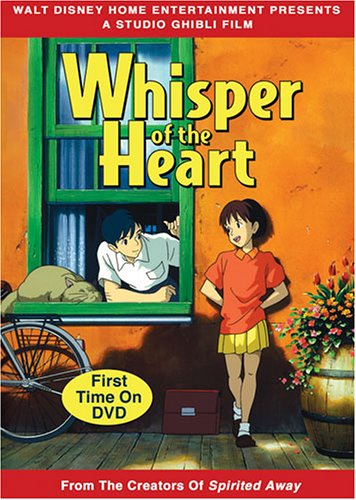All Nonfiction
- Bullying
- Books
- Academic
- Author Interviews
- Celebrity interviews
- College Articles
- College Essays
- Educator of the Year
- Heroes
- Interviews
- Memoir
- Personal Experience
- Sports
- Travel & Culture
All Opinions
- Bullying
- Current Events / Politics
- Discrimination
- Drugs / Alcohol / Smoking
- Entertainment / Celebrities
- Environment
- Love / Relationships
- Movies / Music / TV
- Pop Culture / Trends
- School / College
- Social Issues / Civics
- Spirituality / Religion
- Sports / Hobbies
All Hot Topics
- Bullying
- Community Service
- Environment
- Health
- Letters to the Editor
- Pride & Prejudice
- What Matters
- Back
Summer Guide
- Program Links
- Program Reviews
- Back
College Guide
- College Links
- College Reviews
- College Essays
- College Articles
- Back
Whisper of the Heart
Whisper of the Heart, directed by the late Yoshifumi Kondo and with a storyboard and screenplay by revered film maker Hayao Miyazaki, is an unfortunately lesser-known animated gem. As one of my personal favorites, I have often looked to this movie as an inspiration.
Following the Japanese manga by Aoi Hiiragi, it tells the story of 14-year-old Shizuku Tsukishima; an extremely relatable and likable young girl who enjoys reading fantasy books, writing lyrics, and hanging out at the library or with her friends. Basically, she’s your average teenager, with a charming sense of innocence and friendliness, but still plagued by subconscious insecurities. The story, told through small events, begins to piece together Shizuku’s quest for purpose and personal capability that all of us can relate to. In it, her imagination gives way to fantastical scenes reminiscent of Miyazaki’s well-known fantasy films, but these are used mildly, and I believe they somehow showcase Shizuku’s potential and innocence in a very positive light.
Added to the story is the important sub-plot of Shizuku and Seiji Amasawa, a boy she initially dislikes, but who ends up being the boy who has checked out many of the library books that Shizuku herself reads. Seiji ends up being the grandson of an elderly antique shop owner, whose cat statue, the Baron, helps to inspire Shizuku’s creative work in the film. Seiji’s own ambitions help to inspire her to test her capability.
It’s difficult to summarize the film in the fact that many could describe it as a movie on “nothing,” though I’d sorely disagree. The fact is, rather than physical conflict and danger, and large arcs of events, the film is about many smaller details and the raw sense of emotion from the perspective of a teenage girl. The movie has so many beautiful details; the subtle, realistic relationships of Shizuku with her cranky but well-meaning older sister, her laid-back parents, her best friend Yuko (who is appealing in her own right as she worries over freckles and boys), Seiji, his grandfather, and even a wandering fat cat called Moon. If you think about it, the fact that this movie can pull of nearly 2 hours of strictly exploring a coming-of-age story, is a true accomplishment that must be commended. Of course, the strong sense of atmosphere (little details like flies buzzing around a fluorescent light, clips of realistic background dialogue, beautiful spring-time scenery, Shizuku speaking with toothpaste in her mouth) further distinguishes and strengthens the film. The bright and charming animation of Studio Ghibli is also a strong factor of Whisper of the Heart.
The English dub I also found excellent. Sure, some things were rushed or could have been better-worded or -stated, but I found myself enjoying the dub immensely simply because of how raw and natural it felt. I was surprised to see Ashley Tisdale as Yuko, but I found her to be the perfect choice. I also appreciated that the singing in the movie (simple iterations of John Denver’s “Take Me Home, Country Roads”) was not some doctored-up, perfect performance; rather, everyone showcased a simple and more nonchalant, fun sense of singing. I could not have preferred any other way.
Now of course, this film won’t be for everybody; especially young boys. In fact, this movie is really more for girls in general, though I think any adolescent and reminiscent adult could relate to the film and find something to take away from it. Writers especially should be able to relate to Shizuku’s insecurities. Also, some may find some of the lines corny, but that is because everything is raw and “from the heart.” This is why I find it easy to forgive some slightly uncomfortable lines (though nothing is ever overtly melodramatic or largely unnatural). I will admit that although the movie is close to two hours, some parts felt a little rushed, especially in the parts with Seiji. Also, some may not like the use of John Denver’s “Take Me Home, Country Roads,” as it is an older country song set in a Japanese film. I, personally, grew to love the song. But no movie is perfect, no matter what some critics may say.
The bottom line is that Whisper of the Heart is heartfelt, sweet, touching, relatable, and wonderfully atmospheric and masterfully animated, and one of my Ghibli films, animated features, and children’s movies. I do not believe it fair to compare Hayao Miyazaki’s protégé Kondo to Miyazaki himself; I believe Yoshifumi did a wonderful job and passed away too soon. I am only too glad that he left this glittering gem behind for us to enjoy. A truly poignant masterpiece.
Similar Articles
JOIN THE DISCUSSION
This article has 1 comment.

